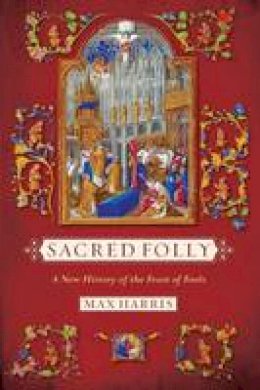10%OFF

Stock image for illustration purposes only - book cover, edition or condition may vary.
Sacred Folly: A New History of the Feast of Fools
Max Harris
€ 41.99
€ 37.61
FREE Delivery in Ireland
Description for Sacred Folly: A New History of the Feast of Fools
Paperback. Num Pages: 336 pages, 1, 1 maps. BIC Classification: HBLC1. Category: (G) General (US: Trade). Dimension: 160 x 235 x 21. Weight in Grams: 496.
For centuries, the Feast of Fools has been condemned and occasionally celebrated as a disorderly, even transgressive Christian festival, in which reveling clergy elected a burlesque Lord of Misrule, presided over the divine office wearing animal masks or women's clothes, sang obscene songs, swung censers that gave off foul-smelling smoke, played dice at the altar, and otherwise parodied the liturgy of the church. Afterward, they would take to the streets, howling, issuing mock indulgences, hurling manure at bystanders, and staging scurrilous plays. The problem with this popular account-intriguing as it may be- is that it is wrong.In Sacred Folly, Max ... Read more
For centuries, the Feast of Fools has been condemned and occasionally celebrated as a disorderly, even transgressive Christian festival, in which reveling clergy elected a burlesque Lord of Misrule, presided over the divine office wearing animal masks or women's clothes, sang obscene songs, swung censers that gave off foul-smelling smoke, played dice at the altar, and otherwise parodied the liturgy of the church. Afterward, they would take to the streets, howling, issuing mock indulgences, hurling manure at bystanders, and staging scurrilous plays. The problem with this popular account-intriguing as it may be- is that it is wrong.In Sacred Folly, Max ... Read more
Product Details
Publisher
Cornell University Press
Format
Paperback
Publication date
2014
Condition
New
Weight
496g
Number of Pages
336
Place of Publication
Ithaca, United States
ISBN
9780801479496
SKU
V9780801479496
Shipping Time
Usually ships in 7 to 11 working days
Ref
99-1
About Max Harris
Max Harris is Executive Director Emeritus of the Wisconsin Humanities Council, University of Wisconsin-Madison. He has also taught at Yale University and the University of Virginia. He is the author of four previous books, including Carnival and Other Christian Festivals: Folk Theology and Folk Performance and Aztecs, Moors, and Christians: Festivals of Reconquest in Mexico and Spain.
Reviews for Sacred Folly: A New History of the Feast of Fools
The modern history of medieval ritual has long been a history of misinformation and misunderstanding. This engaging book is a crucial intervention that should recalibrate the methods for studying early liturgy, drama, and popular culture; it also suggests the need for a reevaluation of larger historical narratives. By gathering, disentangling, and contextualizing primary and secondary sources produced over two millennia, ... Read more
